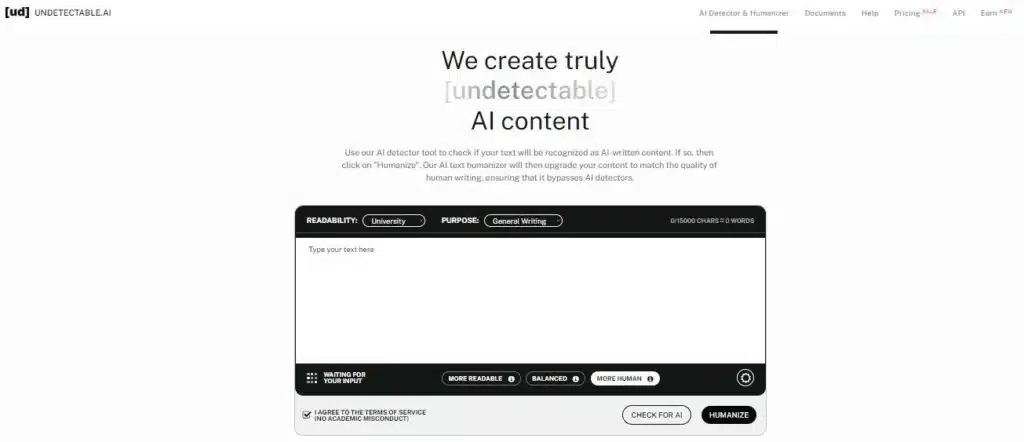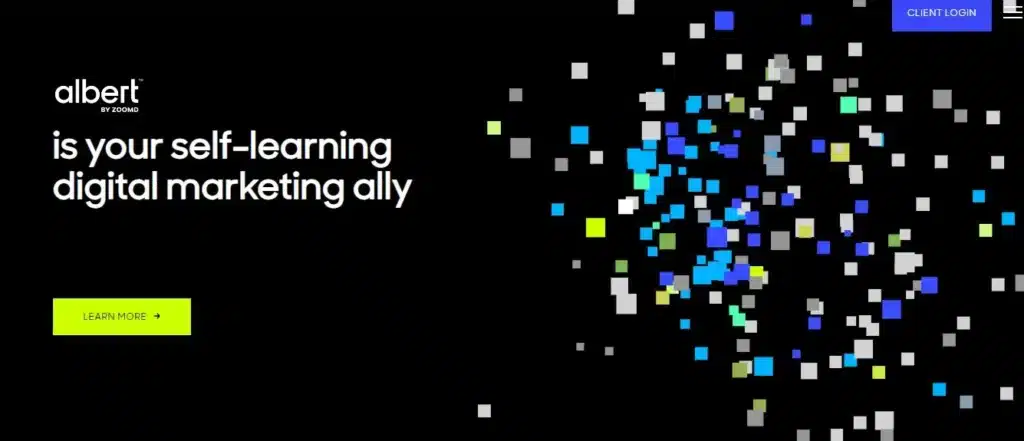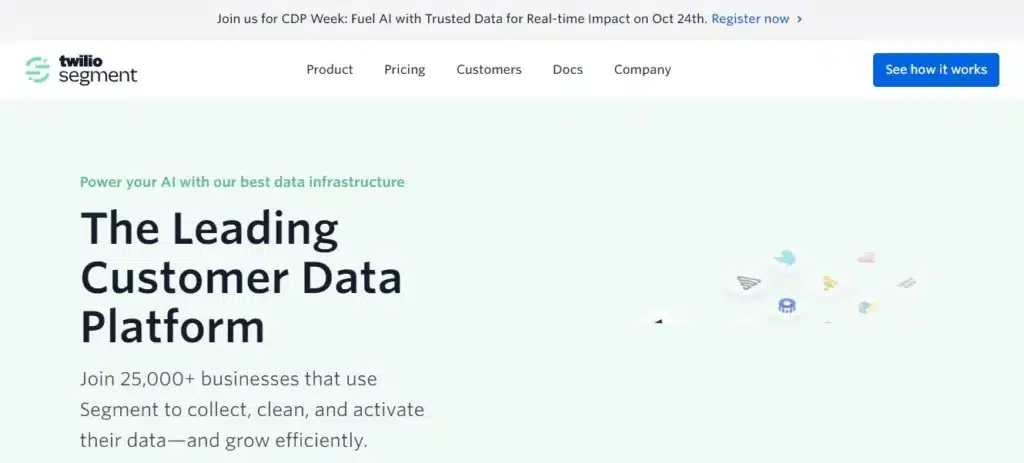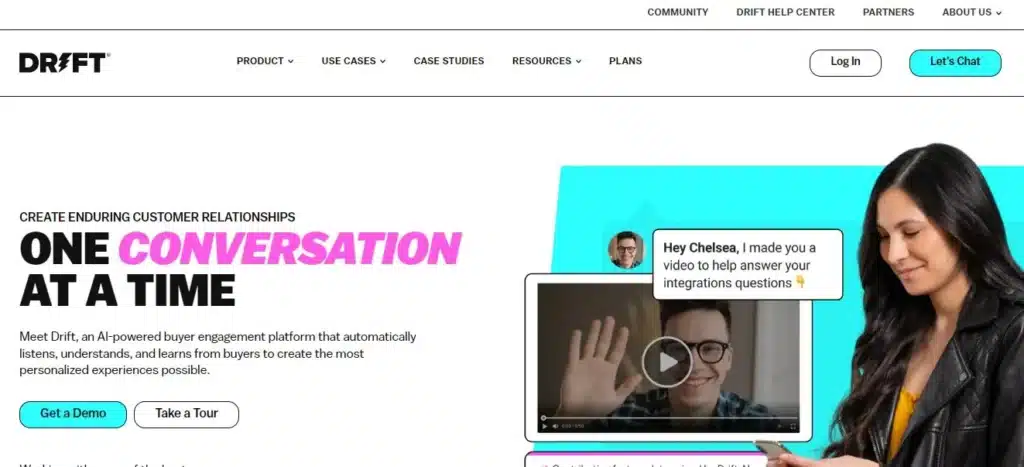Artificial intelligence is transforming marketing. It presents a massive opportunity with 72% of business leaders saying AI will give them a competitive advantage. But the vast majority of companies have yet to take advantage as only 8% implementing AI in Digital Marketing.
Are you ready to adopt AI as your new Digital Marketing Assistant?
In this post, you’ll learn step-by-step how to create an AI marketing strategy. I’ll cover:
- The benefits of AI for marketing teams
- 4 key places to implement AI for maximum impact
- Real examples of brands winning with AI
- Actionable tips to build your AI marketing roadmap
By the end of this guide, you’ll understand exactly how to harness the power of AI to boost engagement, improve conversion rates, optimize spend, and drive performance across all your marketing campaigns.
The future of marketing is here – let’s start integrating artificial intelligence into your strategy today!”
Types of AI Marketing:
Predictive Analytics:
Predictive analytics uses AI to analyze a lot of data and make predictions about future trends or events. In marketing, it helps companies understand what customers might do in the future. For instance, it can predict if a customer is likely to buy a certain product based on their past behavior and interactions.
Personalization:
Personalization in AI marketing means tailoring marketing messages and offers to each person’s individual preferences and behaviors. For example, if you often buy books online, AI might suggest new book releases or genres that match your interests.
Chatbots and Virtual Assistants:
Chatbots and virtual assistants are like robots that use AI to talk to customers online. They can help answer questions, provide information, or even help with buying products. You might have seen them on websites where they pop up to ask if you need help.
Programmatic Advertising:
Programmatic advertising is when AI helps decide which ads to show to people. It uses data to figure out what ads a person is most likely to be interested in. This way, ads are more relevant and effective.
Natural Language Processing (NLP):
Natural Language Processing is like teaching computers to understand human language, like English or any other language. It helps in analyzing what people say on social media, in reviews, or in comments to understand how they feel about a product or brand.
Image and Video Recognition:
AI can look at pictures or videos and understand what’s in them. This helps in marketing by analyzing images or videos people share and using that information to target ads more accurately. For example, if you often post about hiking, you might see ads for hiking gear.
Customer Segmentation:
Customer segmentation is like sorting people into groups based on certain characteristics, such as age, location, interests, or buying behavior. AI helps in doing this automatically, so companies can target their marketing to each group more effectively.
A/B Testing Optimization:
A/B testing is when companies test two different versions of something, like a webpage or an ad, to see which one people like or interact with more. AI helps in analyzing the results and suggesting which version is better for marketing.
Sentiment Analysis:
Sentiment analysis is figuring out how people feel about something. AI can read what people write online, like reviews or comments, and tell if they are happy, sad, or neutral about a product or service. Companies use this information to adjust their marketing strategies.
Marketing Automation:
Marketing automation uses AI to do repetitive tasks, like sending emails or scheduling social media posts. Email marketing platforms use marketing automation powered by AI. If you sign up for a newsletter, AI can automate the process of sending you a welcome email, followed by a series of emails introducing you to the company’s products or services, all tailored to your interests.
The Benefits of AI for Marketing Teams
Artificial intelligence is poised to completely reshape marketing in the coming years. Here are some of the key benefits AI delivers for marketers:
1. Increased Efficiency
AI can automate many routine, repetitive marketing tasks like social media scheduling, email sends, calendar management, data entry, etc. This frees up significant time for marketers to focus on high-value strategic work. According to research by Drift, AI automation can save up to 4 hours per employee per week.
2. Improved Campaign Performance
AI algorithms can analyze huge volumes of audience and marketing data to optimize campaigns for relevance, timing, channel selection and more. Dynamic creative optimization powered by AI ensures each audience sees the most resonant creative. This leads to higher engagement and conversion rates. Statistics show that AI-optimized campaigns improve clickthrough rates by up to 30%.
3. Enhanced Personalization
AI tools can build detailed customer profiles based on demographics, behaviors, preferences, context, and real-time interactions. This enables ultra-targeted 1:1 messaging and experiences. Studies indicate that 76% of consumers want personalized interactions with brands.
4. Predictive Analytics
Sophisticated machine learning algorithms can uncover patterns in data to make predictions about future customer behaviors and trends. This powers preventive maintenance and helps marketers anticipate challenges before they arise. According to McKinsey, predictive analytics can reduce fraud detection costs by up to 25%.
5. Hyper-Relevant Content
AI can generate high-quality, human-like content tailored to each user’s needs and interests. This powers hyper-personalized content at scale. Recent surveys show 45% of marketers are already using AI for content creation.
6. Improved Budget Management
Intelligent algorithms can optimize budgets across channels and campaigns for ideal allocation and ROI. They spot spending inefficiencies and automatically shift investment to better-performing assets in real time. This maximizes the impact of every marketing dollar. Reports indicate AI optimization can reduce cost per click by up to 40%.
Key Places to Implement AI in Your Marketing Strategy
Now that you know the powerful benefits AI can offer, let’s look at 4 critical areas to implement artificial intelligence across your marketing activities:
1. Content Creation
AI content tools can generate blogs, social posts, emails, landing pages, and more tailored to each user. They analyze audience data to determine optimal content types, sentiment, topics, offers and calls-to-action for each segment.
For example, Undetectable AI is an AI platform focused on emotion-driven language optimization. It serves as an AI-powered rephrasing tool, asserting its ability to transform 100% AI-generated content into a more human-like form.

2. Ad Targeting & Optimization
AI can make detailed customer avatars to target ads with precision. It also optimizes campaign elements like messaging, creative, placements, and bidding in real-time based on performance data.
For instance, Albert is an AI platform that manages and optimizes digital ad campaigns end-to-end. It uses machine learning to continuously refine targeting, increase relevancy, balance budget across networks and devices, A/B test creative, and maximize ROI.

3. Customer Intelligence
AI can help marketers automatically compile audience data from all sources into a unified customer intelligence hub with the help of AI-powered customer data platforms (CDPs). This creates 360-degree customer profiles that you can instantly segment, analyze, and activate across channels.
Segment is a popular CDP that leverages machine learning to translate raw customer data into actionable insights. It enables marketers to track users from initial touchpoint across devices, surfaces behavioral trends, predicts churn risk, and triggers personalized campaigns like cart abandonment re-targeting.

4. Conversational Marketing
Incorporating AI chatbots can deliver personalized conversational experiences at scale across platforms like the web, mobile apps, messaging apps, and voice assistants.
For example, Drift’s marketing AI assistant books meetings instantly, engage site visitors in real time, qualifies leads with conversational surveys, and integrates directly with marketing automation workflows. Drift reports that AI-powered chatbots generate 5X more leads than forms alone.

Real-World Examples of Brands Winning With AI
Still not convinced about the power of artificial intelligence in marketing? Here are some real-world examples of brands already achieving amazing results:
- Spotify uses AI algorithms to analyze users’ listening habits and build super-detailed taste profiles. These profiles power highly personalized music recommendations and curated playlists tailored to each listener. This AI-driven personalization is a huge driver behind Spotify’s subscriber growth and retention.
- Netflix analyzes mountains of audience data with sophisticated machine learning systems to understand viewing behaviors. This enables Netflix’s AI recommendation engine to predict which shows and movies each member will enjoy with incredible accuracy. Serving hyper-relevant content is key to Netflix’s ongoing dominance.
- Amazon has fully embraced AI across its business, especially in marketing. Product recommendations use AI to suggest purchases based on browsing history and purchases by similar customers. Predictive shipping uses AI to map fulfilment routes and anticipate delivery times. Fraud detection is powered by AI pattern recognition. Amazon’s marketing cloud services leverage AI to optimize digital ad campaigns. The list goes on and on.
- LinkedIn built Project Falcon, an AI-based system that observes how members interact with content on the platform. Falcon surfaces the most relevant professional news stories and content recommendations tailored to each user’s career interests, network connections, and profile data. This personalization increased member engagement 38% year-over-year.
- Sephora’s chatbot AI assistant asks shoppers a series of questions about their skin type, preferences, and goals to customize skincare product recommendations. Compared to Sephora’s old chatbot platform, this AI-powered virtual advisor drove 11X more conversions.
- Starbucks feeds real-time data on store traffic, local events, weather patterns and sales into machine learning models that optimize staff scheduling and inventory management. By minimizing waste based on AI forecasts, Starbucks has saved $1 billion in food cost avoidance.
- Lexus’ AI-powered digital assistant “Lexi” enables customers to have natural text and voice conversations to ask questions about their vehicles, book service appointments, and more. Lexi is available 24/7 via the Lexus app, their website, and voice assistants like Amazon Alexa. The AI assistant has significantly boosted customer satisfaction scores.
How to create an AI Driven Marketing strategy
Now that you’ve seen the data on AI marketing power and real examples of it in action, it’s time to build your own roadmap to leverage artificial intelligence. Follow these 6 steps to integrate AI into your marketing strategy:
1. Identify Your Goals
First, clearly define the specific business and marketing goals you want AI to help achieve. Do you want to boost campaign conversion rates by 25%? Reduce cost per lead by 30%? Shorten sales cycles from 3 months to 1 month? Get very targeted so you can properly evaluate AI’s impact later.
2. Audit Your Processes
Conduct an audit of all your key marketing processes from lead generation to nurturing and identify pain points. Look for tasks that are repetitive, time-intensive, or inconsistent in output. Those are prime opportunities for AI marketing automation and optimization. Also note processes with large volumes of untapped data – AI can help uncover insights.
3. Research AI Solutions
Based on the goals and processes identified above, thoroughly research AI marketing software solutions that can address your needs. Search for platforms with proven success optimizing campaigns, creating content, building customer profiles, having natural conversations, etc. Create a shortlist of leading options in each area.
4. Run Pilot Programs
Don’t try to revamp everything at once. Pick 1-2 high-priority use cases like lead qualification or creative design to pilot first. Sign up for free trials of shortlisted vendors. Test each rigorously by feeding in real data and evaluating impact on your KPIs. Choose the 1-2 platforms delivering the best results to move forward with.
5. Integrate & Implement
Once you’ve selected the best AI tools for your needs, integrate them with the rest of your marketing stack using APIs and dedicated connectors. Develop a rollout schedule across your marketing programs. Provide teams with proper training.Monitor closely to spot any integration or adoption issues.
6. Optimize & Expand
AI improves over time, so you must constantly feed systems new data while monitoring performance on key metrics. Look for ways to optimize utilization and expand to new use cases. Keep current on AI marketing innovations and upgrade tools as needed to access the latest capabilities. Set a goal to implement AI across your full marketing technology stack.
The Future of AI in Marketing is Here
AI is the most transformative technology force shaping the future of marketing. As consumers expect ever-greater personalization and relevance from brands, implementing artificial intelligence is no longer optional.
But AI marketing should not be viewed just as a quick automation win. Its real value comes from leveraging machine learning to unlock marketing capabilities and insights previously unfathomable.
Brands who embrace AI now will gain an unbeatable competitive advantage. Those who delay adoption will find themselves unable to keep up as AI-enabled rivals reshape customer expectations across industries.
The AI marketing revolution has arrived. The time is now to start integrating it into your tech stack and processes. By following the tips outlined in this guide, you’ll be able to build an AI marketing strategy that delivers unmatched efficiency, insight and results.
The future of marketing belongs to artificial intelligence. It’s time to start leveraging its benefits today to get ahead of the curve and win big.
Conclusions:
The age of AI in marketing is here. No longer can brands rely solely on antiquated methods and expect to thrive. AI empowers marketers to create experiences of unparalleled personalization and relevance at incredible scale. It provides an undeniable competitive advantage to those who embrace it early. The choice is yours – begin building your AI-powered marketing strategy today and take the lead, or delay and watch your competitors race ahead. With the right strategy, implementing AI is easier than you think. Follow the steps in this guide to assess your needs, find the right tools, run targeted pilots and ultimately transform your marketing. The future belongs to those who boldly integrate AI now. Will you lead the charge into the new era of intelligent marketing?
FAQs
How to make money with AI marketing?
- Develop AI-powered marketing tools that enhance customer targeting, personalization, and engagement for businesses.
- Offer AI-driven marketing consulting services to optimize advertising strategies and campaign performance for clients.
- Create and sell AI-generated content, chatbots, or predictive analytics solutions tailored to marketing needs, generating revenue through subscriptions or one-time purchases.
What is the best AI tool for digital marketing?
- Google AI-powered tools like Google Ads and Google Analytics offer robust data analysis and advertising optimization capabilities for digital marketing.
- HubSpot AI integrates seamlessly into marketing workflows, providing automation, lead scoring, and personalized recommendations to enhance campaign effectiveness.
- Salesforce Einstein AI delivers advanced analytics, predictive modeling, and customer segmentation, optimizing marketing efforts and driving ROI for businesses.
What is an example of AI in marketing?
AI in marketing can automate email campaigns, personalize customer recommendations, and analyze consumer behavior to optimize ad targeting and strategies. For instance, AI-powered chatbots engage customers in real-time, enhancing customer service and driving conversions. Additionally, predictive analytics using AI can forecast market trends, aiding in strategic decision-making for marketing campaigns.


